The Balearic Islands Experience
The Balearic Islands have been a privileged destination for centuries, welcoming countless famous figures: artists, writers and painters from all around the globe have made our islands their home. In this sense, the archipelago is far more than merely one of the foremost tourism centres in the Mediterranean. It is an environment that generates creativity, art, music and gastronomy. A paradise with a captivating landscape.
The Balearic Islands are pure diversity. An archipelago where each island has its own distinct character and features. Islands full of history, with a cultural and monumental heritage that embodies the footsteps and the testimony of all the cultures that have sailed to their shores.
Factsheet
Map and Details of the Islands
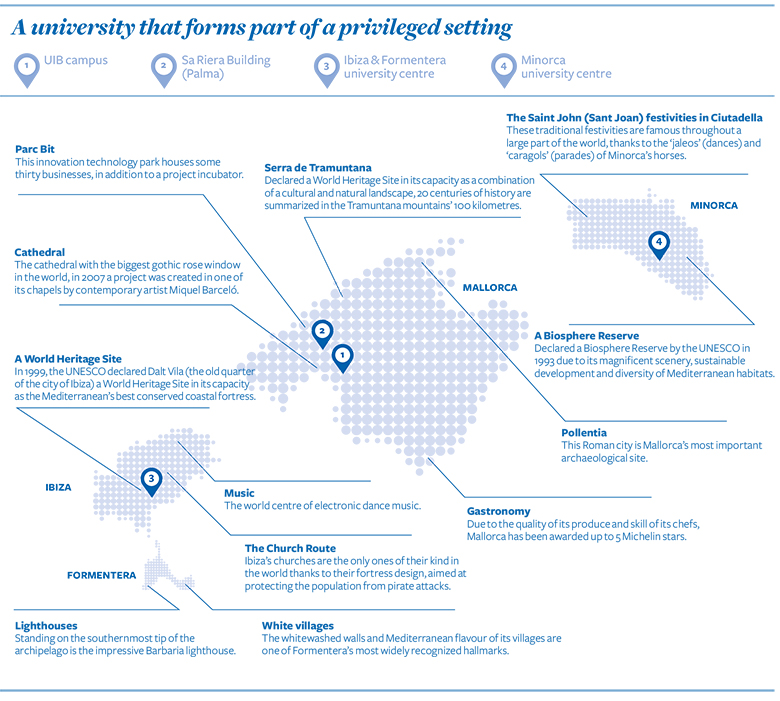
The UIB: the 16th-largest Town
The UIB is home to nearly 18,200 students, 1,000 lecturers and researchers, and 500 administrative and services professionals. If the UIB were a town, it would be the 16th-largest in the Balearic Islands, out of a total of 67.
Proximity to Europe
Distance from Palma
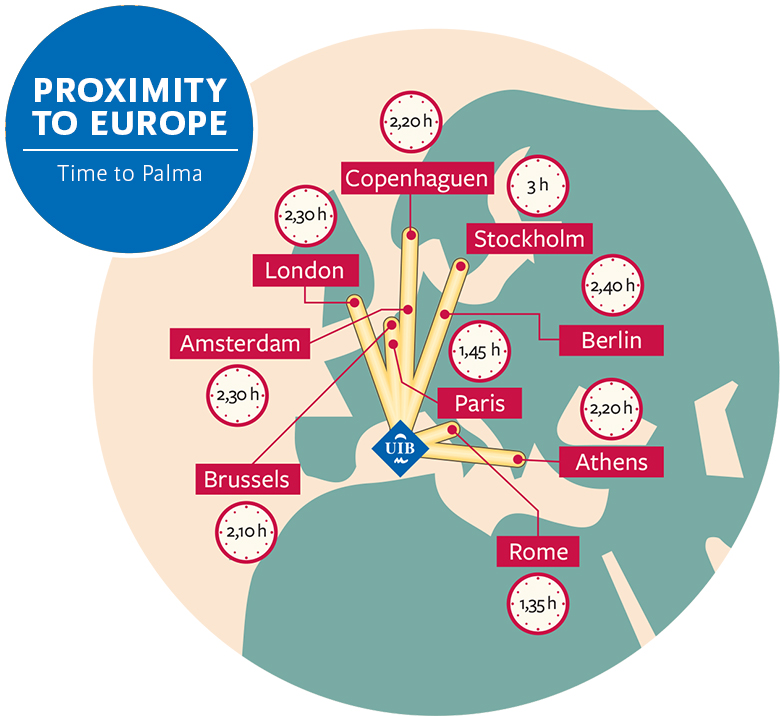
| City | Kilometres | Hours |
|---|---|---|
| London | 1,345 | 02:30 |
| Berlin | 1,660 | 02:40 |
| Rome | 869 | 01:35 |
| Paris | 1,034 | 01:45 |
| Amsterdam | 1,435 | 02:30 |
| Brussels | 1,262 | 02:10 |
Hours of Sunshine

| City | Days of sunshine | Days of rainfall | Average annual temperature |
|---|---|---|---|
| Palma | 300 | 51 | 16ºC |
| Paris | 200 | 164 | 11.5ºC |
| London | 200 | 164 | 9.6ºC |
| Berlin | 250 | 113 | 12.9ºC |
| Amsterdam | 180 | 185 | 9.7ºC |
| Copenhagen | 250 | 113 | 8ºC |
| Stockholm | 260 | 105 | 6.7ºC |
| Brussels | 230 | 132 | 10.3ºC |
Source: http://www.climatedata.eu/
Breathtaking beaches
With crystal-clear waters, the nearly 300 beaches of the Balearics offer an unrivalled variety for the visitor, ranging from virgin coves to strands that feature every service imaginable.

Cala de Deià. Eduardo Miralles. Image courtesy of the Govern de les Illes Balears / Conselleria de Turisme i Esports / Agència de Turisme de les Illes Balears (ATB)
Water sports
Water sports are one of the fortes of this community surrounded by the sea. Our waters are the privileged backdrop of countless regattas of international prestige. Moreover, the islands boast a very complete network of nautical companies and facilities that offer their services.
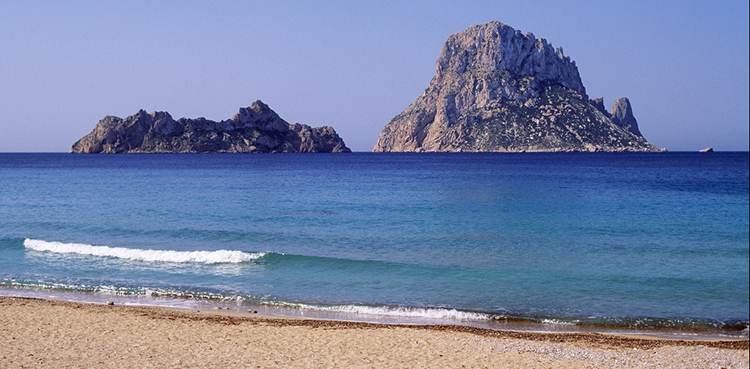
Es Vedrà i es Vedranell. Giorgio Gatti. Image courtesy of the Govern de les Illes Balears / Conselleria de Turisme i Esports / Agència de Turisme de les Illes Balears (ATB)
The Tramuntana Mountains and hiking
One of the best ways to get to know and enjoy the landscape of our islands is by setting out along some of its hiking trails. The Serra de Tramuntana Mountains—the main exponent of this activity—were declared World Heritage in 2010 and are now the second most sought-after mountain destination in Spain by international travellers.
- SPANISH INSTITUTE OF TOURISM (2008). ‘Estudio de productos turísticos: turismo de montaña’ [Online article]
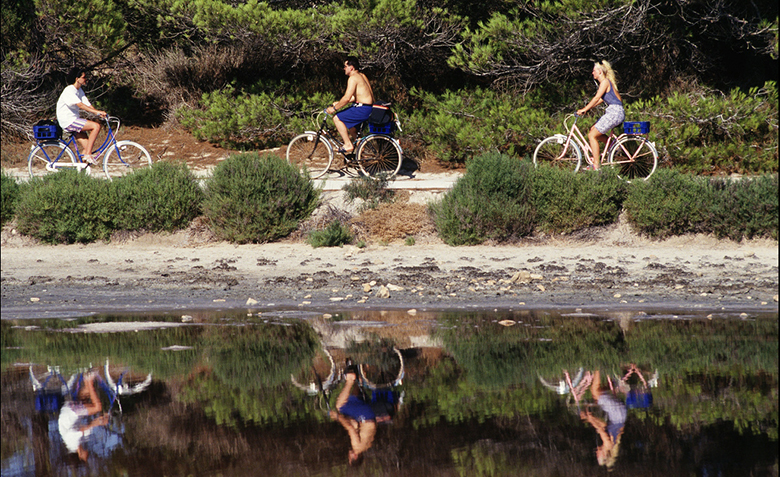
Bicicletes a Ses Salines. Manfred. Image courtesy of the Govern de les Illes Balears / Conselleria de Turisme i Esports / Agència de Turisme de les Illes Balears (ATB)
Balearic cuisine
The Balearic cuisine is original and exquisite. With its clear base in the Mediterranean, the food of the Balearic Islands is similar to the cuisines of Catalonia and Valencia. By virtue of their location, the Balearics are a cultural crossroads that have received the culinary influences of the Arabic, Jewish and Italian peoples. In the case of Menorca, the legacy left behind by the French and English rule is also patent.
Today, the archipelago is proud to have five Michelin-star chefs, who have often rescued the traditional recipes of the past and adapted them to today’s more modern haute cuisine. Their mastery and the quality of their dishes have made a name for the Balearic cuisine around the world.
Hotel and catering school
Since its founding by the Balearic Islands Government and the UIB in 1995, the Hotel and Catering School has become an indispensable institution for the recovery, conservation and spread of the Balearic cuisine. This school has brought to the world such fine chefs as Macarena de Castro, who received a Michelin Star for her restaurant El Jardín, and teachers such as Tomeu Caldentey who similarly earned a Michelin Star for his restaurant, Es Molí d’en Bou.
Through its programmes which generate specialists in kitchen and restaurant services, restaurant and bar management and administration, and fine food, this school trains its students using an interactive system that aims to improve the scientific and technological skills of hotel and catering staff. Practicums are an essential part of this education and are incorporated into the curricula at the midpoint in the educational process, affording students first-hand insight to the reality of some of the best establishments in the Balearic Islands.
Yet in addition to its programmes for professionals, the Hotel and Catering School also reaches out to cooking aficionados and fine food lovers. For those who enjoy cooking, the school offers a wide range of workshops and classes, where students work alongside Mallorca’s top chefs. And for those who love to eat, the school hosts an entire schedule of theme cooking conferences, in addition to offering a daily menu and its special Friday banquet buffet, all at very affordable prices.
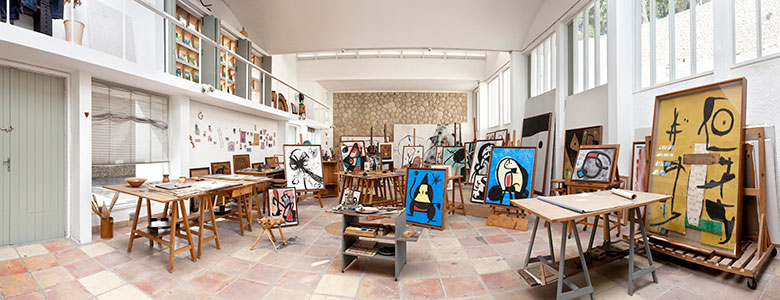
Image courtesy of the "Fundació de Turisme Palma de Mallorca 365"